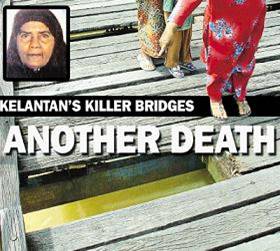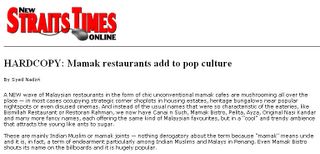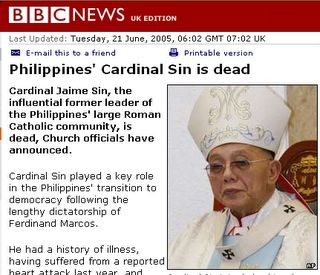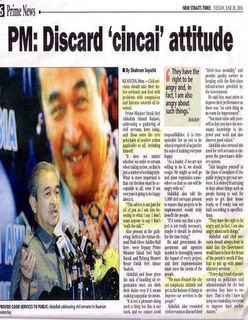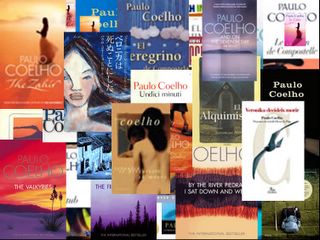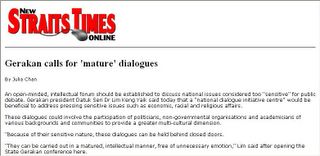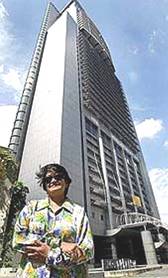
Sothi suspended

Datuk S. Sothinathan paid a stiff price for breaking ranks with the Government in Parliament yesterday: He was suspended for three months as Deputy Natural Resources and Environment Minister. This is the first time such a punishment has been meted out to a senior Barisan Nasional component party leader who is also a member of the administration.
Indeed, it emerged last night that some senior administration officials believed the only suitable punishment for breaching one of the cardinal principles of the BN — that of settling disagreements behind closed doors — was dismissal.
Sothinathan, 45, MP for Teluk Kemang, declined to say very much. "Yes, I received a phone call regarding my suspension, and I don’t have anything to say about it.
"I only want to say that for the next three months I will concentrate on my party work. I will also spend more time in my constituency."
Other senior MIC politicians were also sparing with their comments. They were trying to clear the confusion among MIC members across the country and douse an emotional response from the rank-and-file.
Sothinathan crossed swords with Deputy Health Minister Datuk Dr Abdul Latiff Ahmad over the de-recognition of the Crimea State Medical University (CSMU) by the Malaysian Medical Council (MMC).
During a heated debate on the issue, Dr Abdul Latiff said that all but one of the BN component party chiefs had accepted the MMC decision. The exception he referred to was MIC president Datuk Seri S. Samy Vellu.
This remark upset Sothinathan, who stood up and said: "We (MIC) are the party in Government representing the Indian community. It is our duty to right a wrong when it happens."
Prime Minister Datuk Seri Abdullah Ahmad Badawi said that as a member of the Government, Sothinathan should not have taken a stand critical of the Government.
"It is a breach of party discipline," Abdullah told reporters. Abdullah said Sothinathan, who was the MIC secretary-general, could be the first member of the Malaysian administration to be suspended for disagreeing with the Government in Parliament.
"There is always a first time for everything."
The Prime Minister has received the consent of the Yang di-Pertuan Agong for Sothinathan’s suspension.
Minister in the Prime Minister’s Department Datuk Nazri Aziz said that: "What happened was unprecedented. He broke ranks from the front bench... he was at fault and that is why I think action was taken against him."
During the three-month suspension, Sothinathan’s seat in Parliament would be moved to the back benches from the front bench.
He said the suspension was a warning to members of the administration not to go against the Government’s position or policies.
"If you are a member of the administration, it is your duty to defend the stand, decision and policy of the Government. "You cannot have your cake and eat it, too. If you don’t agree, then you can always resign and speak as a backbencher," Nazri said.
Deputy ministers are bound by the principles of collective responsibility under existing code of conduct and ethics for administrative officers, said Chief Secretary to the Government Tan Sri Samsudin Osman.

Ministerial Responsibility

Tan Sri Shamsudin said the Cabinet discussed yesterday the issue of Datuk S. Sothinathan questioning the decision of the Malaysian Medical Council regarding the Crimea State Medical University.
Following the meeting, the Cabinet decided to get the consent of the Yang di-Pertuan Agong to suspend for three months, with immediate effect, the duties of the Natural Resources and Environment deputy minister.
MINISTERIAL irRESPONSIBILITY, The New System of Government?The Doctrine for the Convention of Ministerial responsibility is basically adopted to ensure the proper accountability of government in Parliament. The doctrine consist of Collective Responsibility and Individual Responsibility.
Collective Responsibility means that members of the cabinet and ministers as a whole, are answerable and accountable to Parliament, and that they must collectively support the
final decisions made by the cabinet inorder to show unity by vote or speech, in and outside Parliament.
However, in this case, the Deputy Natural Resources and Environment Minister, Sothinathan, had only reacted during a heated debate on the Crimean issue, when Dr Abdul Latiff said that all but one of the BN component party chiefs had accepted the MMC decision. The exception he referred to was MIC president Datuk Seri S. Samy Vellu. This remark upset Sothinathan, who stood up and said: "We (MIC) are the party in Government representing the Indian community. It is our duty to right a wrong when it happens."
In the context of the application of collective responsibility, we have not seen ELSEWHERE that a minister is reprimanded thru' the exercise of this royal prerogative for a situation whereby, a wrong decision made by a department was held to be a FINAL CABINET DECISION.
Doesn't this sound ludicrous and preposterous?
Aren't the application of collective responsibility used to cover-up culpable decisions?
My God, what have you done to my Prime Minister such that he had gone berserk and vagarious?
In a another news report, the Higher Education Ministry today confirmed that it had issued Non-Objection Certificates (NOCs) to Arts stream students who failed their Sijil Pelajaran Malaysia examination. Minister Datuk Shafie Salleh said the students were given the NOCs to enable them to gain entry into the Crimea University in Ukraine to realise their dreams of becoming doctors.
(see:
Shafie: We issued the certs )
An NOC is a prerequisite for entry into any university abroad offering medical courses recognised by the Government.
"According to Higher Education Department director Professor Datuk Dr Hassan Said, whom I met this morning, these students were issued with NOCs although they failed their SPM," Shafie said.
"This was because they had additional certificates that carried more weight or were equivalent to the SPM," he said before chairing his post-Cabinet meeting at his ministry today.
He said the "additional certificates" were among those awarded to students who passed the SPM Mathematics and Bahasa Melayu papers in July after having failed in the subjects previously.
He said the issuing of NOCs in this manner was in accordance with ministry regulations."Although they had failed their SPM examinations, they could still gain entry into universities as their other qualifications showed they were qualified."
Shafie said the ministry would stop issuing NOCs for this particular university beginning Jan 1.
PUZZLED? The system of education has always being, that 'O' level exam (SPM) is not modular, but strictly required that all candidates must pass certain mandatory subjects and pass the minimum number of subjects, and have achieve a mimimum aggregate score to be awarded the SPM certificate. What it also mean is that, if a student fails the full exam, and later, resit the few failed subjects, he has not fulfilled the necessary requirement to qualify himself a 'O' Level certificate. What is required to fulfill the criteria for 'O' level is, you have to resit the whole exam, i.e., all the subjects at the same exam.
If someone had failed the SPM ('O' level), he cannot sit for his STPM ('A' level). Maybe, he can have some other kind of certificate, but entry qualification to universities, in particular, Medical Doctorate courses requires the minimum entry qualification, i.e. 'O' level (from Science Stream) plus, probably a pass in pre-university education examination. And, in the case of those medical students who are accepted into Malaysian Universities, the requirements presumably is 10As and above, in SPM, and from Science Stream ONLY!!!!.
Here, we heard of a case where the Ministry had approved someone from the ART STREAM who had failed the SPM and yet approved to further his medical studies in U. Absurd, rediculous, & vagarious?NO! NOT YET!
The MMC decision not to recognize the medical degree from University of Crimea was attributed to the fact that it had accepted medical students who had failed in the SPM. The Higher Education Ministry today confirmed that it had issued Non-Objection Certificates (NOCs) to Arts stream students who failed their Sijil Pelajaran Malaysia examination. Higher Education Minister Datuk Shafie Salleh said the students were given the NOCs to enable them to gain entry into the Crimea University in Ukraine to realise their dreams of becoming doctors. The Minister said these students, "Although they had failed their SPM examinations, they could still gain entry into universities as their other qualifications showed they were qualified."
So, what's the problem? Where's the problem?
Isn't the decision of MMC a direct act of contempt, and a slap in the face of the minister of higher education? The decision of the Health Ministry is contradictory to the decisions of the Higher Education Ministry, and the cabinet agrees to both decision simultaneously?
Did we have a problem? I don't think so. The philosophical and ideological aspects have different tangent and have moved to the outer realms beyond the rule of wisdom into a world of arbitrary conduct manned by a system of governance of absolute absurdity and discretionary rule of law in our motherland.
God forbid that we are returning to the dark age period.
